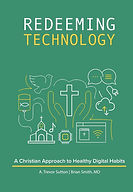
Last Update 9/1/2025
For more on spiritual formation, visit the Spiritual Formation Resources.
You may also want to visit:
-
Technology & Mental Heath Resources
-
Philosophy of Technology & Religion Resources
For my publications on spiritual formation see:
-
-
“Virtue Formation and The Sanctifying Work of the Holy Spirit.” With Steven L. Porter (2020). Download
-
“Neuroscience, Spiritual Formation, and Bodily Souls.” With C. Stephen Evans (2018). Download
-
“Eternal Life as Knowledge of God” (2013). Download
-

Spiritual Formation
& Technology
Thematic Annotated Bibliography
The annotations refer to specific views in the philosophy of technology: technological pessimism, optimism, and realism. To learn about these views, go here.
1. Virtue & Character Formation
Christlikeness as bulwarks against the deforming pressures of technological culture.

Schultze argues that our media habits are not neutral—they shape the moral and spiritual core of our lives. He calls Christians to resist shallow values by cultivating character and virtue rooted in God.

Shows how every new medium subtly rewires our imagination of God, community, and truth, and why Christians can’t afford to ignore the way technology disciples us even as we use it.

Borgmann applies his philosophy of technology to Christian life, showing how technological distraction erodes faith and embodied worship. He urges recovery of “focal practices” such as table fellowship, prayer, and Sabbath.

Kallenberg blends philosophy of technology with Christian theology, warning against technological idolatry while showing how discipleship reorders our use of tools.
2. Attention & Simplicity
Against distraction and acceleration, these works commend focus, slowness, and simplicity.

Urges Christians to resist the pull of distraction by cultivating “focal practices” like shared meals, prayer, and Sabbath rest. Deeply pastoral, showing how attentiveness to God requires practical reordering of life.
3. Digital Habits
Daily faithfulness in a screen‑saturated world.

Diagnoses how smartphones shape desire, attention, and identity, drawing on Scripture and cultural analysis. He shows that phones disciple us daily, and only intentional formation can resist their pull.
5. Cultural Critique & Personhood
How devices shape identity, presence, and power.

Spiritual Disciplines for Living with Technology
10 Practices
1. #####
Technology Retreats
1. ######
Links to My Essays
Popular Essays
-
Technologically Formed in Christ?
-
Why Dallas Willard Wouldn't have a Twitter/X (for reasons you might not expect)
-
The Spiritual Damage of Online Culture Wars (on both sides)
Scholarly Essays
-
The Spirit of Our Technology
-
The Moral Psychology of Google and Apple: Case Studies in UX Manipulation
-
The Neuroscience and Ontology of Technological Addiction



















